© 2014-

TV Noordzee (3)
About six weeks before the new legislation was expected to come into effect the assets of TV Noordzee were transferred to a British company, High Seas Television Ltd., of London. This holding company, owned by Eric Bent, director of a London based printing company, had a nominal share capital of £100 and was authorised by REM to operate the television station and determine its daily programme schedule. At the same time ownership of the REM Island itself was transferred to a Panamanian registered company -
Having transferred, o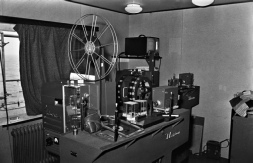 n paper at least, ownership of both the structure and the broadcasting operation Radio and TV Noordzee's owners argued that, although the artificial Island was built on the 'continental shelf' the companies owning the structure and the stations broadcasting from it were both foreign and therefore Dutch broadcasting laws could not be enforced against them. As a precaution, however, they took out an insurance policy for 9 million Dutch Guilders (£900,000) through Lloyds of London against the risk of any physical seizure of the 'Island' by the Dutch authorities.
n paper at least, ownership of both the structure and the broadcasting operation Radio and TV Noordzee's owners argued that, although the artificial Island was built on the 'continental shelf' the companies owning the structure and the stations broadcasting from it were both foreign and therefore Dutch broadcasting laws could not be enforced against them. As a precaution, however, they took out an insurance policy for 9 million Dutch Guilders (£900,000) through Lloyds of London against the risk of any physical seizure of the 'Island' by the Dutch authorities.
At about the same time that the assets of REM were transferred to new owners a new organisation - was formed by some of the people behind the REM Project with the objective of applying for a temporary licence to transmit from the artificial Island. In the six weeks between its formation and the passing of the new Dutch legislation TROS enrolled over 200,000 members, which qualified it as an organisation able to apply for such a licence under the Dutch broadcasting system.
was formed by some of the people behind the REM Project with the objective of applying for a temporary licence to transmit from the artificial Island. In the six weeks between its formation and the passing of the new Dutch legislation TROS enrolled over 200,000 members, which qualified it as an organisation able to apply for such a licence under the Dutch broadcasting system.
In the run-
The hope was that TROS, broadcasting with a temporary licence from the REM Island would be in a position to benefit from the grant of a permanent licence when the promised review of Dutch broadcasting took place. An alternative strategy was also devised -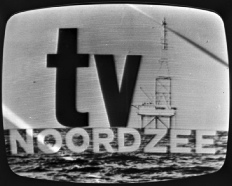
Meanwhile the television station from the REM Island was proving extremely popular with the public -
Nevertheless the Dutch Government vigorously pursued its opposition to the offshore television (and radio) station housed on the REM Island and legislation giving effect to an extension of sovereignty over the continental shelf and any structures built on it was passed in the Dutch Senate, by 57 votes to 9, on 1st December 1964, becoming law twelve days later. The new law had been designed specifically to close Radio Noordzee and TV Noordzee and did not apply to Radio Veronica, (which by December 1964 had been on the air for four and a half years), because that was a ship-
In compliance with the new legislation TV Noordzee in fact ceased transmissions on 12th December 1964, after only three and a half months on the air -
However, Radio Noord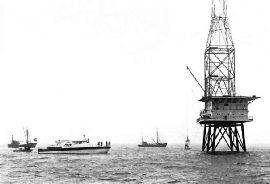 zee did continue to broadcast in defiance of the law and Cor Verlome instructed crew on board the REM Island not to physically repel any official boarders who may be sent to close the station as this could jeopardise the insurance cover which had been taken out for such an eventuality.
zee did continue to broadcast in defiance of the law and Cor Verlome instructed crew on board the REM Island not to physically repel any official boarders who may be sent to close the station as this could jeopardise the insurance cover which had been taken out for such an eventuality.
After five days of Radio Noordzee broadcasting in defiance of the new law the Dutch authorities decided to act. They had delayed action the day after the new law came into effect because of bad weather and then information was received that the REM Island now belonged to a Panamanian company. The broadcasting rights were also held by the British company, High Seas Television Ltd who at that stage were threatening legal action against the Dutch authorities. 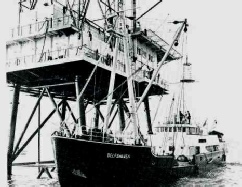
The Dutch Naval vessel, Delftshaven took up position 200 yards from the REM Island at approximately 8.58am on Thursday, 17th December 1964. Five minutes later three helicopters appeared and hovered overhead, the first dropped a marker flare onto the rooftop helipad and at 9.03am the other two landed a force of armed police on the artificial Island. At 9.07am transmissions of Radio Noordzee were abruptly silenced by the authorities in the middle of the record "Paradise" by Anneke Gronloh during a programme presented by Sonja van Proosdjijk.
Radio Noordzee's closure and the confiscation of its broadcasting equipment was carried out under the personal supervision of J F Hartsuijker, Amsterdam's Assistant Public Prosecutor, who had arrived on board the Delftshaven.



Click on picture to enlarge
Delftshaven alongside REM Island 17th December 1964
(Photo: Hans Knot)
Dutch authorities arrive at REM Island to silence Radio Noordzee, 17th December 1964.
(Photo: Hans Knot)
TV Noordzee studio
(Photo: Hans Knot)
The Dutch authorities board REM Island, 17th December 1964
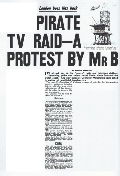
Daily Mirror
18th December 1964




Floor 2
Back to






